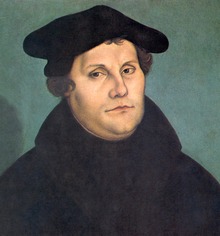Microsoft Word
 |
| History of Printing |
Similarly, with the invention of the printing press came a newfound freedom. Words could now spread throughout the world without the painstaking task of hand-copying. Ideas could take root more firmly and take route faster than ever before.
Martin Luther and the Press
Martin Luther famously posted his 95 Theses on the door of the Wittenberg Castle Church on October 31, 1517. It is speculated that Luther originally wanted only to make the issues known and that he had no intention of causing such a far-reaching disruption to the Catholic Church. However, as his ideas
caught on he decided to instigate a greater push for reform. As Jonas Bush says in his blog the Printing Press: Downfall of the Catholic Church, “Luther and his followers made great use of the printing press and began widely distributing his 95 theses and also a new translation of the Bible.” Without the printing press, Luther’s ideas may not have spread sufficiently and history would have been greatly altered because of it. Yes, Luther could have stood before a crowd and preached what he had written, but with a physical copy, people were able to refer back to what he had written.

Martin Luther (1529) by Lucas Cranach the Elder
In the blog post Luther’s Decorum, Rylee H. says that Luther, “was able to challenge Catholicism on their own terms, using their own texts and canon.” Luther was a monk and could read Latin, which means he was able to read the scriptures. It was by referring to the texts that he was able to see the discrepancies between what was being taught and what was in the text. This is what originally helped him to form his theses. He later translated the Bible into German, which was the common language. Now everyone could go back to the source and compare Luther’s notes with the words of the Bible, which was the next big step in sidestepping Catholicism.
The Spread of the Bible
Unfortunately for the Catholic Church, the printing press would continue to prove to be a disastrous invention. Now that so many copies of the Bible were being printed, more and more families had direct access to God’s words and they had the freedom to interpret them and compare them to the words that they were taught in their cathedrals. Church leaders started to be questioned by church goers, and the clergy members were finding it difficult to maintain their hold on people’s loyalty and blind trust. Luther's claims continued to circulate and forever damaged the Catholic Church.
Truly, the invention of the printing press allowed the world to move from the Renaissance into the ever-brightening light of the Reformation. Luther and the press can be described as being the torchbearers who carried a type of reformation into the hearts of the common people.
comms-in-renaissance-and-reformation
Image Credit: "History of Printing" (courtesy of Wikipedia)
"Martin Luther" by Lucas Cranach the Elder (public domain)

No comments:
Post a Comment